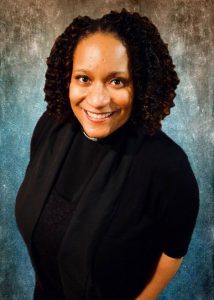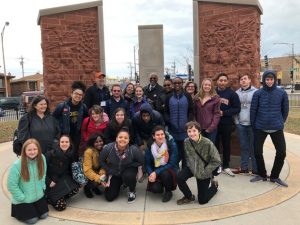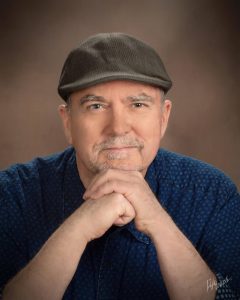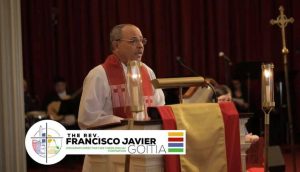
Full Sermon
By: Francisco Javier Goitía Padilla
ELCA Chapel – February 19, 2020
Matthew 5:21-37
Grace to you from the One and Triune God,
Forever and ever. Amen.
This is my second time in Chicago.
I lived in Hyde Park from 2001-2005.
Now I live in West Dundee
And commute to the Lutheran Center.
One of the many things different here than in Puerto Rico
Is the way people give directions.
Chicago is a square, filled with straight lines.
So when you ask, where is Millennium Park?,
People say:
Go North three blocks,
then East four blocks,
And you will find it right parallel to Michigan Avenue.
You do not give directions like that in Puerto Rico.
If you ask, where is the baseball park?
They will lead you more or less this way:
Go straight for a while ‘till you get to the mango tree.
When you get to the mango tree, then turn left.
Keep straight and you will find three speed bumps.
After the third speed bump,
you will find a yellow house at your right.
Turn left and ask a guy at the corner bar.
He will help you there. —
The way we give directions is important.
They will help us, or not, to find a safe place.
Today we have some directions in Matthew’s text.
We either get them straight to form a square,
Or smell the mango tree on an adventure to new places.
This is the conundrum today, I think.
How to get directions. How to interpret.
In this text. In church. In this country.
We need to discern which hermeneutics is life-giving.
The larger interpretive framework today is the beatitudes.
Blessed are you…the poor, the meek, the merciful.
This larger hermeneutical framework tells us
That Jesus is not suffocating us with a rigid literalism,
With squares and straight lines,
But challenging us with an intensified ethics.
With a liberating ethics.
Today’s text presents us four situations addressed to people that can,
To protect those who can’t.
For the blessed ones to be dignified.
Those who mourn. The peacemakers.
Those persecuted because of righteousness.
The text begins with brothers and sisters.
With family, community and church.
Not to murder is to dignify.
Not to murder is not destroy, not to do violence, not to abuse or dismiss anyone.
Explaining the fifth commandment in the Large Catechism,
Luther said:
We should not harm anyone, either by hand or deed.
We should not use our tongue to advocate or advise harming anyone.
We should harbor not hostility nor malice against anyone.
We must invite family, community and friends to the table.
We need to invite them with our words and deeds.
Those who can, come to the table
Without thinking in anyone but themselves.
Those who think they can live without others,
Need to think and act otherwise.
We should add, not divide. —
The text continues with women.
It deals with objectivization.
It denounces abuse and entitlement.
Power is on the side of men.
By force, by law and by culture.
The ones who lust, here, are men.
Powerful men. Because they can.
And get away with it.
Jesus knows, and intensifies his ethics.
If your right eye causes you to abuse women,
Tear it out and throw it away.
If your hand causes you to use women as a commodity,
Cut it off and throw it away.
If we extend this hermeneutics in its liberating direction,
We can say women are not objects of desire nor lust.
We can say, today, that women are free.
Free to do. Free to dress. Free to decide.
They should not need protection.
Yet it is apparent that even today in the 21st century they still do.
As Jesus protected them in his comment about divorce. —
As men used the law to control and objectify women,
They also used their power to marry and get divorced.
Jesus bound men to the law to protect women.
To protect women from poverty and marginalization.
To protect, today, is equal pay for equal job.
Equal opportunities for equal competencies.
To protect, today,
May be to safeguard the rights and dignity
Of every human being
Who is used and ostracized by patriarchy.
Who feels the need to become invisible to survive. –
You see, to give directions is tricky.
It is a matter of power and control.
We decide how and where to lead.
If to the north or south through a straight line,
Or to the baseball park surpassing speed bumps. –
Jesus’ last advice today is about oaths.
To speak about oaths is to speak about contracts.
It is to speak about labor and societal agreements.
Let our word be “Yes, yes” or “No, no”.
The ones who can change their “yes to no” and their “no to yes”
Were the ones who owned the contracts.
The ones who can manipulate the system.
Jesus leveled the field.
Let’s commit our words to our actions.
Our language to inclusion.
Let’s not hide in small print or in propaganda.
Let’s not use our influences to take advantage of people,
Or to benefit our clan at all cost.
Let our word be “Yes, yes” or “No, no”.
Let our relationships be sustained by the truth. By what it is.
Let not decide our labor relationships, our societal mores,
Or our communal future,
Based on manipulation or the sanctification of alternative facts.
Let our relationships be grounded in honesty and character.
In integrity and hope.
Martin Luther King Jr. said it this way:
Man must evolve for all human conflict a method
which rejects revenge, aggression and retaliation.
The foundation of such a method is love.
And he said more:
I have decided to stick with love.
Hate is too great a burden to bear. –
Brothers and sisters,
Our hermeneutical vocation today,
It is the way we give directions.
It is not a matter of rigid literalisms,
But of hopeful challenge of an intensified ethics.
It is the cross, in the midst of all,
Providing a safe place for those who can’t.
It is to venture to new places
Smelling the mango trees at the side of the road.
The Beatitudes say it well:
Blessed are you when people insult you,
persecute you and falsely say all kinds of evil against you because of me.
Rejoice and be glad, because great is your reward in heaven,
for in the same way they persecuted the prophets who were before you.
Amen.
Biographical data:
Francisco Javier Goitía Padilla is an ordained minister of the ELCA rostered in the Caribbean Synod and has worked as pastor in Puerto Rico and Chicago. Currently he is the Director for Theological Formation for Seminaries and Schools of the ELCA. He worked as professor of systematic theology and homiletics at the Seminario Evangélico de Puerto Rico from 2005 to 2017.

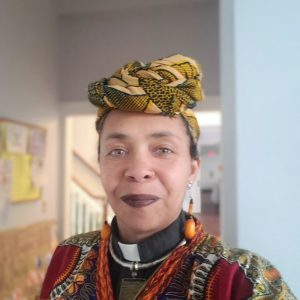
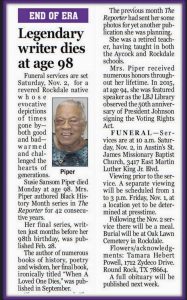 Recently, Susie Piper, my middle school Texas history teacher died at the age of 98. She led a remarkable life and was an amazing teacher. She is one of the reasons I learned early on that white supremacy is a lie and I am so thankful for that lesson. I reached out to her a few years ago and to tell her she and Ms. Petty (a black woman who was my most excellent high school biology teacher) were the best teachers I had from Rockdale. I had some exchanges with Ms. Piper and Emzy Jerome Hebert (her son). We gave each other a few books and I got a history lesson that I sure don’t remember ever hearing in school.
Recently, Susie Piper, my middle school Texas history teacher died at the age of 98. She led a remarkable life and was an amazing teacher. She is one of the reasons I learned early on that white supremacy is a lie and I am so thankful for that lesson. I reached out to her a few years ago and to tell her she and Ms. Petty (a black woman who was my most excellent high school biology teacher) were the best teachers I had from Rockdale. I had some exchanges with Ms. Piper and Emzy Jerome Hebert (her son). We gave each other a few books and I got a history lesson that I sure don’t remember ever hearing in school.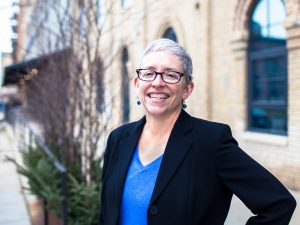 Shari is a European descent Lutheran living in Minneapolis with her wife and two sons. She sells houses and dismantles white supremacy in the Lutheran Church. She is on the board of the European Descent Lutheran Association for Racial Justice and the Minneapolis Synod anti-racism table.
Shari is a European descent Lutheran living in Minneapolis with her wife and two sons. She sells houses and dismantles white supremacy in the Lutheran Church. She is on the board of the European Descent Lutheran Association for Racial Justice and the Minneapolis Synod anti-racism table.